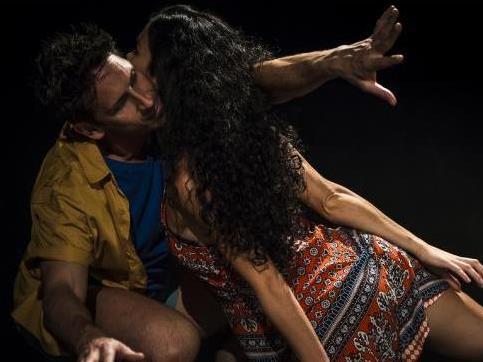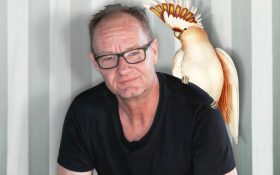Force Majeure in partnership with Dance Integrated Australia in Off the Record. Photograph by Gregory Lorenzutti.
Off the Record from Sydney based physical theatre company Force Majeure, in partnership with Dance Integrated Australia, is a challenging and provocative night of performance, important largely for the many questions that it raises. The performance does not offer easy solutions and in this lies perhaps its greatest strength, as the questions it poses are offered to the audience in the form of provocations.
Off the Record is the second commission from Carriageworks’ National Arts and Disability Strategy New Normal, through which Carriageworks has committed to commissioning 10 new major multi-artform works over the next three years to contribute to integrating disability arts practice into contemporary arts.
For her inaugural work as Artistic Director of Force Majeure, Danielle Michich and co-Director Philip Channells, are working with five superb performers, Jana Castillo, Alex Jones, Gerard O’Dwyer, Marnie Palomares and Niel Phipps. This new work Off the Record centres around the total commitment of these strong and absorbing performers – and explores their bodies, their desires, and their personal experiences. In a process related to verbatim theatre, the performers were asked to contribute to the creation of the show by revealing some of their most personal, secret histories. These stories then formed the basis of the final performance text that was reworked by Text Dramaturg, Zoe Coombs Marr.
The final text of their stories is at times signed in Auslan, or spoken by the performers or projected onto screens. As this text is performed, a subtext emerges which concerns authenticity. The performers were originally asked to tell secret stories that were ‘off the record’ as part of the creation process, however, as they were contributing stories for eventual performance in a public arena which they were well aware would be very much ‘on the record,’ did these performers reveal stories that were in fact true, or were their stories a fiction created to give the illusion of real life confessions?
After revealing what is initially presented as her personal history of suffering from Tourettes Syndrome, performer Jana Castillo says, ‘You know this is all made up don’t you?’ and she winks at the audience, and then she adds, ‘or do you?’ With those questions and her wink, we move from what is initially presented as verbatim theatre and the presentation of interviews about personal experiences of disability, into the problematic territory of crip face or crip drag.
What is authentic? What is real? Is the performer you are watching disabled or are they assuming the guise of a physically disabled person? How does your perception of the performer change when they move from being what you perceive as a differently abled person to revealing their real identity as a ‘TAB’ or ‘temporarily abled’ person (a term often used by as disability activists in preference to ‘able-bodied’)? Is it acceptable for a performer to enter the ethically troubled waters of crip face or crip drag if, through that process of reveal, they are aiming to get the audience member to confront their own assumptions or prejudices about difference and differently abled people.
These questions provoke and challenge the audience throughout the show.
The issue of the possibility of authentic contact between people in a world of fictitious and multiple selves however pales into relative insignificance as, in the final minutes, we hear the voice of Alex Jones, a deaf performer originally recruited by the Australian Theatre of the Deaf in 1997, talking about isolation. In his own very distinctive and particular voice, he talks more specifically about the problems of isolation and lack of communication as a deaf person in a hearing society. The image of isolation as Alex Jones describes deafness as closing in around him like the sound of white static stays with you long after the show has ended.
Other standout images that burn themselves into the mind are the extraordinary, moving and virtuosic dance solo from Jana Castillo, and the moment when Marnie Palomares attempts to communicate with deaf performer Alex Jones by opening her mouth wide, placing it on his open mouth, and literally putting words in his mouth by shouting them into his body.
These powerful moments of dance and physical theatre underpin the extraordinary potency of the physical to communicate complex emotions and understandings which can prove evasive – too slippery to pin down through translation into a text equivalent.
Carriageworks’ National Arts and Disability Strategy New Normal, is an essential and long overdue initiative, and, if this new work is an example of the sort of works that will emerge, it will be exciting to see the rest of the works as they appear.
Rating: 4 out of 5 stars
Off the Record
Force Majeure in partnership with Dance Integrated Australia
Directors: Danielle Michich and Philip Channells
Set and Lighting Designer: Ben Cisterne
Sound Designer: Kindsley Reeve
Text Dramturg: Zoe Coombs Marr
Performers: Jana Castillo, Alex Jones, Gerard O’Dwyer, Marnie Palomares and Niel Phipps
Carriageworks
17-20 August





